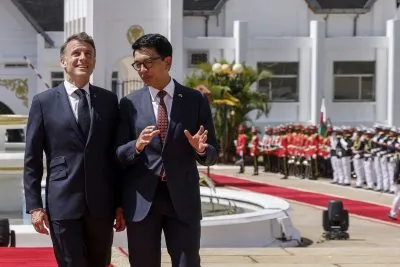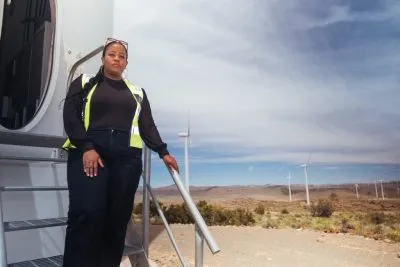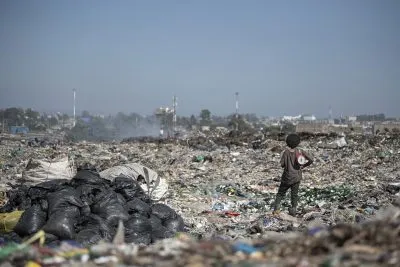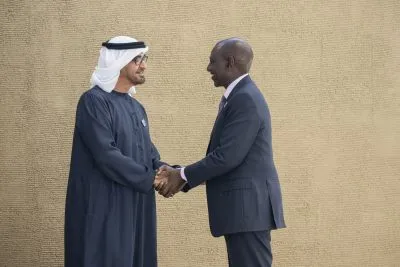Africa has the potential to be the world’s food basket, but huge challenges remain in attracting investors and ensuring that new ventures benefit the continent.
Twenty-two years ago, when the Danish conflict expert Kim Johannes first arrived in Uganda, farming did not seem like a viable option at all.
The East African nation was recovering from chronic post-independence instability, and its people were still coming to terms with a seemingly never-ending series of coups.
Conflict was still raging in the north, where the Lord’s Resistance Army led by Joseph Kony was wreaking havoc. When Johannes, then a volunteer, was posted to the area, he could not wrap his head around the poverty and suffering that ravaged the region.
“It was quite scary. I came because I had no choice. Northern Uganda is where I was assigned,” he recalls.
Two decades later, however, this very same place has turned into a lucrative hub for agricultural activity, and Johannes has become a successful farmer. As head of AFGRI, a South African agricultural company, he now works with local farmers to produce high-quality grain for consumption within the country and for export to over 15 countries worldwide.
According to Johannes, his current success would have been impossible without the numerous failures that came before it, events that he says helped him recognise the importance of “understanding the community”. This, he believes, is key to successful investment in Africa’s agricultural sector. “[Foreign] investors make the mistake of thinking that they can behave the same way they did in Germany or Denmark and put up high walls. They make the mistake of being very arrogant and very European,” he says.
Johannes adds that the reality of Africa is very different to that portrayed in the popular media.
“There is so much potential. There is all this fertile land that is not fully utilised because either the people have no skills or capital,” he says. “The Acholi sub-region [in northern Uganda] alone could feed Uganda, the Democratic Republic of Congo and South Sudan.
“There is now security on the continent and
agriculture can lift the people out of poverty and end food insecurity.”
The world’s food basket
According to the 2014 Africa Progress Report, 60% of the world’s uncultivated arable land is located in Africa, meaning the continent has the potential to become the world’s food basket. In theory, Africa could meet the needs of the globe’s growing population, expected to reach 9bn by 2050.
The report expresses optimism that agriculture in Africa is starting to attract the attention needed to fulfil this transformative potential, but the Food and Agriculture Organisation (FAO) estimates that investment still needs to increase by at least 50%.
According to the FAO, just 5% of foreign direct investment in Africa goes to agriculture. The sector has attracted Western partners such as the UK, US, Netherlands and Germany as well as the likes of India, Brazil and China. Yet while FDI in Africa’s agricultural sector is increasing, it remains low, and most of the farming is still done by locals.
But talk of “Agripreneurship”, for both local and foreign investors, is growing. And governments are teaming up with major development partners to harness the power of the continent’s growing youth population and channel it into agriculture.
In a bid to give the image of agriculture a complete makeover in Uganda, for example, a young beauty queen has become the new face of farming. Furthermore, foreign commercial farmers are also contributing to African agriculture’s image transformation as they break the stereotype of keeping to safe “expat” areas and move into the countryside, where they farm and live with locals.
“People hear stories of successful foreign farmers and feel inspired to start their own projects. They think if a muzungu is doing it, then it must be bringing in some money,” says Otto Labejja, a smallholder farmer and agricultural editor at the Ugandan newspaper New Vision.
All this is helping to slowly change perceptions about agriculture, but Rony Oved, Director of Agromax, a company that advises local and foreign agribusiness investors, points out that there are still many stumbling blocks.
In spite all the prospects being flaunted, foreign investors are well aware of the infrastructural and other challenges that still exist.
“You have to be self-contained. You need to find a way to generate your own water, electricity and work on your own access roads. These are still very real problems,” he says.
Who’s getting fed?
The World Bank, amongst others, believes that FDI is important for promoting healthy competition in the agricultural sector. But foreign investment in Africa has not been without criticism. Investors, for example, have been accused of land grabbing, entering dubious deals with government, and flouting local and international labour standards.
In 2012, Oxfam warned that in poor countries, investors bought land equivalent to the size of London every six days, and argued that this was undermining efforts to fight food insecurity. The FAO has also pointed out that most of the products grown as a result of foreign investment are exported rather than used to feed people in Africa itself. The agency argues that if these methods of investments are not revised, local farmers in Africa will continue to be disadvantaged.
In 2012, the G8’s New Alliance for Food Security and Nutrition was formed and was meant to be a step towards addressing some of these complaints. But the initiative contained laws and regulations that drew loud and sustained criticism, and the proposal was accused of being a form of neo-colonialism, drawn up behind closed doors, and cleverly engineered to favour private investors over smallholder farmers.
According to Johannes, partnerships with foreign businesses are crucial to “uplift” the community, but he recognises that those investments ultimately need to benefit locals.
“The community needs to know whether you are going to make their lives better,” he says. “They want to know first of all: Are you a good neighbour? Will you build a borehole and stop them from fetching water from it?”
Unsurprisingly, Johannes believes that AFGRI has been a good neighbour in northern Uganda. But while investors from across the world eye up the huge
potential of African agriculture, big questions remain over who stands to benefit. Who would get to eat the proceeds of an African agricultural boom?
Patience Akumu
Want to continue reading? Subscribe today.
You've read all your free articles for this month! Subscribe now to enjoy full access to our content.
Digital Monthly
£8.00 / month
Receive full unlimited access to our articles, opinions, podcasts and more.
Digital Yearly
£70.00 / year
Our best value offer - save £26 and gain access to all of our digital content for an entire year!
 Sign in with Google
Sign in with Google 


